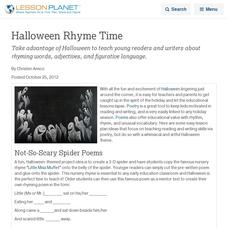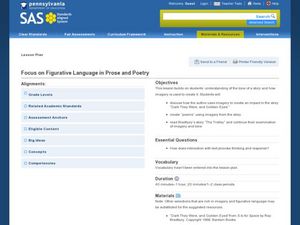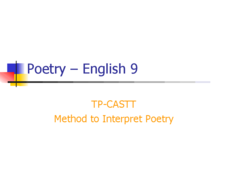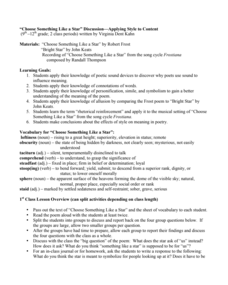Curated OER
Using Similes and Metaphors in Poetry
The use of similes and metaphors will become more clear and your students will gain knowledge and comprehend the meanings of the words with these activities. They compose interesting similes and metaphors based on visual prompts and...
Curated OER
Sound poems
Third graders write a class poem based on the use of sound to create effects. They investigate use of onomatopoeia and how to write in a tight structure.
Curated OER
Biographical Poems
Students write a biographical poem about themselves. They observe a teacher-led demonstration, write an autobiographical poem and a biographical poem about a famous person using a template form, and display the poems side-by-side.
EngageNY
Looking Closely at Stanza 3—Identifying Rules to Live By Communicated in “If”
Just as Bud, from the novel Bud, Not Buddy by Christopher Paul Curtis, had rules to live by, so does the poem, If by Rudyard Kipling, but how do the two relate? Pupils delve deep into the poem's third stanza, participate in a grand...
Curated OER
Preparing for Poetry: A Reader's First Steps
Students complete poetry analysis using William Shakespeare's "Sonnet 130" as a part of a study of figurative language. In this Shakespearean language lesson plan, students define literal and figurative language and practice paraphrasing...
Curated OER
Halloween Rhyme Time
Take advantage of Halloween to teach young readers and writers about rhyming words, adjectives, and figurative language.
Curated OER
Analyzing Literary Devices
Eighth graders identify figurative language and poetry in this literary analysis lesson. Using Through the Looking Glass by Lewis Carroll and a YouTube video for "The Walrus and the Carpenter," young readers complete a literary device...
Curated OER
Revision
Young poets learn the value of using a thesaurus when crafting and revising poems. They examine poems rich in figurative language and then a revised version with the figurative language removed. To demonstrate what they have learned,...
Curated OER
Lesson Plan: Letting Go
Why would an artist destroy his own work? Kids examine the Malagan practice of creating and then destroying art. They talk about the cultural and spiritual significance of this practice, as well as how it relates to consumerism in...
Curated OER
Figurative Language Scavenger Hunt
Eighth graders analyze and interpret figurative language. They listen to some examples of poetry which use figurative language. Then, they divide into groups and attempt to find more examples. Finally, 8th graders write what the poet is...
Curated OER
Focus on Figurative Language in Prose and Poetry
Students place emphasis on the use of figurative language when analyzing prose and poetry. In this figurative language lesson plan, students explore the tone of a story and its imagery. Students read and discuss how the author uses...
Curated OER
Out of the Dust: Figurative Language
Students find examples of figurative language in "First Rain" in Out of the Dust. In this Out of the Dust lesson, students takes notes on various type of figurative language and identify examples of each type in the poem.
Curated OER
Figurative Language and Symbolism
Students identify figurative language and symbolism in poetry as well as prose. In this literary elements lesson, students read and discuss the role of symbolism in Yellow Man by Moonlight, A Christmas Carl, The House of Wings, and...
Curated OER
Identifying Figurative Language
In this figurative language worksheet, students identify figurative language in the sentences and explain their answers. Students complete 10 problems.
Alabama Learning Exchange
Poetry-English 9
Are your readers lost in the world of poetry? Show them this basic presentation to study elements of a poem. They learn the importance of the title, paraphrasing, connotation, tone, shifts, and theme.
Curated OER
Poetry, Take Me Away!
Students explore a variety of poetry and poetry concepts. They examine figurative language, mood, and literary devices. The students write and recite their own poetry.
Curated OER
Can You Figure Language?
Eighth graders study similes and metaphors and how to explain and create them. After a lecture/demo, 8th graders access websites and worksheets imbedded in this plan to create their own writing.
Curated OER
Lincoln is in the House! ("Name-Dropping" Poems and the Power of Connotation)
“What’s in a name?” Just about everything. Barack Obama, Vincent van Gogh, Justin Bieber. Famous names evoke a multitude of reactions and poets often use the names of famous people in their works precisely because names carry...
Prestwick House
Rhyme and Repetition in Poe's "Annabel Lee"
Many and many a year ago Edgar Allan Poe crafted the chilling tale of "Annabel Lee." The poem is the perfect vehicle to introduce Poe's concept of unity of effect, the idea that every element in a poem or story should help to develop a...
Curated OER
Shelley's Poems by Percy Bysshe Shelley
Challenge your class with these essay questions based on Percy Bysshe Shelley's poetry. This resource includes 3-8 short answer and essay questions for each of 9 different poems by Shelley. Pick and choose the poems you would like to...
Curated OER
Identifying Personification in Poetry
Improve your young poets' descriptive writing with this lesson on personification. A SMART board and PowerPoint presentation guide your class through the process of identifying human qualities attributed to various non-human objects. A...
Robert Frost Farm
“Choose Something Like a Star” Discussion—Applying Style to Content
Robert Frost's "Choose Something Like a Star" and John Keats' "Bright Star" provide the text for a two-part instructional activity in which class members analyze the effects of style on meaning in poetry. Randall Thompson's song cycle...
Curated OER
Anonymous Patriots: Songs of the Revolution
Give your class a deeper understanding of the context and meaning behind early American song lyrics. By reading the lyrics to "Yankee Doodle" and "Revolutionary Tea," high schoolers will practice analysis by examining the structure and...
Curated OER
Poetry Scrap Book
After your poets have compiled several written poems into a scrap-book, use this grading scale to explain how they'll be graded. The only guiding explanation of the assignment explains that they need to use two of the five literary...

























